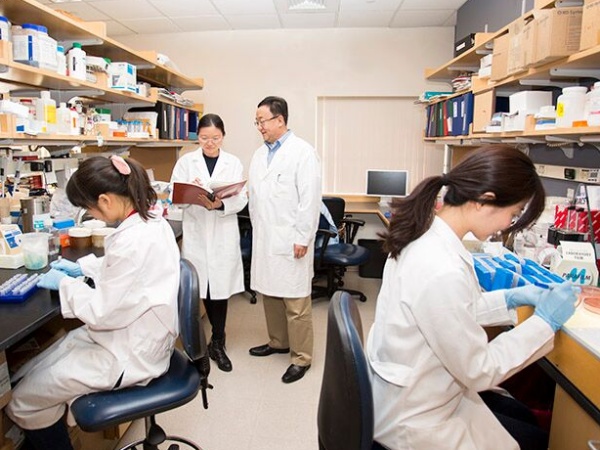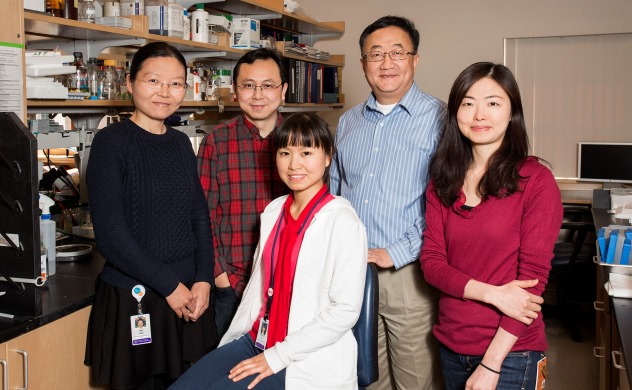Mucosal Immunology and Biology Research
Shi Lab: Hai Ning Shi, DVM, PhD
Contact Information
Explore This Lab
Overview
Research in the Laboratory of Hai Ning Shi, DVM, PhD, at Massachusetts General Hospital is focused on three areas:
- The effects of chronic intestinal helminth infection on concurrent infection with bacterial enteropathogens
- The influence of early intestinal colonization with probiotic organisms on subsequent mucosal immune responses
- The effects of maternal gestational factors on the development of allergic disease in the offspring
In each of these projects, we use a combination of in vitro and in vivo experiments to clarify the mechanisms that contribute to alterations in immune function.
The overall goal of these studies is to understand basic principles in immunoregulation in the gut and to use this information to shed light on diseases in which intestinal immunity is disturbed.
Research Projects
Helminth Infections and Mucosal Response
The inverse correlation between exposure to helminthes (parasitic worms) and the incidence of certain immune-mediated diseases, including inflammatory bowel diseases (IBD), has been evidenced from epidemiological studies.

The distribution of several pathogenic helminth infections coincides geographically with many devastating microbial diseases, such as HIV, malaria, and tuberculosis.
Infections with intestinal helminths and enteric bacterial pathogens, such as enteropathogenic Escherichia coli (EPEC), continue to be a major global health threat, especially for children.
However, the nature of the interaction and the exact mechanism by which helminth modulates the host’s response to concurrent pathogens are still unclear.
Our laboratory investigates the role of helminth parasites in evoking a T helper cell intestinal response and its effect on bacterial invasion.
We are particularly interested in exploring the mechanisms by which the helminth parasite modulates intestinal mucosal response to enteric bacteria and bacteria-associated intestinal inflammation using a co-infection model system.
This system involves two murine enteric infectious agents that induce distinct Th responses: (i) the helminth Heligmosomoides polygyrus (Th2) and (ii) the Gram-negative bacterium Citrobacter rodentium(Th1).
Research in the Shi lab has shown that helminth co-infection results in an impaired host protection and the development of more severe C. rodentium-mediated intestinal inflammation by a STAT 6 (Th2) dependent mechanism. Dr. Shi has also shown that the helminth modulates host response via the effect of dendritic cells.
In collaboration with Dr. Allan Walker, Dr. Shi also examines the impact of intestinal colonization of bacteria (probiotics) during early life on the development and regulation of mucosal T cell responses (Th1, Th2 and T regs) and explores the mechanisms by which probiotics modulate host protection against enteric pathogens.
Using both in vivo and in vitro approaches, Dr. Shi examines and defines the conditions under which dysregulation of intestinal mucosal response to luminal antigens triggers the development of intestinal inflammatory responses that ultimately result in chronic inflammatory disease.
His research will provide greater insight about how intestinal microorganisms may alter the regulatory mechanisms of mucosal immunity, which may be instrumental in the establishment of effective preventive and therapeutic approaches for the treatment of Th1- and Th2-mediated diseases and for the design of effective intestinal vaccines.
Lab Members
Principal Investigator

Hai Nigh Shi, DVM, PhD
Investigator, Mucosal Immunology and Biology Research Center, Massachusetts General Hospital
Associate Professor of Pediatrics, Harvard Medical School
Research Team
Chienwen Su, PhD, Instructor of Pediatrics
Mei Zhang, MD, Postdoctoral Fellow
Ning Chen, DVM, PhD, Postdoctoral Fellow
Shaorong Long, MD, PhD Student
Publications
Selected Publications
Lynne Harrington, Chittur V. Srikanth, Reuben Antony, Sue J. Rhee, Andrew L. Mellor, Hai Ning Shi, and Bobby J. Cherayil. Deficiency of Indoleamine 2,3-Dioxygenase Enhances Commensal-Induced Antibody Responses and Protects against Citrobacter rodentium-Induced Colitis. Infection and Immunity. 2008. Vol. 76: 3045-3053. PMCID: PMC244672
Yasuyo Shimomura, Atsuhiro Ogawa, Mayumi Kawada, Ken Sugimoto, Emiko Mizoguchi, Hai Ning Shi, Shiv Pillai, Atul K. Bhan, and Atsushi Mizoguchi. 2008. A unique B2 B cell subset in the intestine. The Journal of Experimental Medicine, Vol. 205, No. 6, 1343-1355. PMCID: PMC2413032
Lijian Wang, Erin E. Johnson, Hai Ning Shi, W. Allan Walker, Marianne Wessling-Resnick, Bobby J. Cherayil. Attenuated inflammatory responses in hemochromatosis reveal a role for iron in the regulation of macrophage cytokine translation. The Journal of Immunology. 2008. 181 (4) 2723-2731. PMCID: PMC2561261
Michael Pazos, Dario Siccardi, Karen L. Mumy, Jeffrey D. Bien, Steve Louie, Hai Ning Shi, Karsten Gronert, Randall J. Mrsny, and Beth A. McCormick. Multi-Drug Resistance Transporter 2 Regulates Mucosal Inflammation by Facilitating the Synthesis of Hepoxilin A3. The Journal of Immunology. 2008. 181(11):8044-52. PMCID: PMC2596662
Lijian Wang, Yue Cao and Hai Ning Shi. Helminth infections and intestinal inflammation. World J Gastroenterol. 2008 Sep 7;14(33):5125-32. PMCID: PMC2744001
Annaiah Cariappa, Hiromu Takematsu, Haoyuan Liu, Sandra Diaz, Khaleda Haider, Cristian Boboila, Geetika Kalloo, Michelle Connole, Hai Ning Shi, Nissi Varki, Ajit Varki, and Shiv Pillai. B cell antigen receptor signal strength and peripheral B cell development are regulated by a 9-O-acetyl sialic acid esterase. The Journal of Experimental Medicine. 2009.16;206(1):125-38
Chen CC, Chiu CH, Lin TY, Shi HN, Walker WA. Effect of probiotics Lactobacillus acidophilus on Citrobacter rodentium colitis: the role of dendritic cells. Pediatr Res. 2009 Feb;65(2):169-75
Wang L, Harrington L, Trebicka E, Shi HN, Kagan JC, Hong CC, Lin HY, Babitt JL, Cherayil BJ. Selective modulation of TLR4-activated inflammatory responses by altered iron homeostasis in mice. J Clin Invest. 2009. 119(11):3322-8. PMCID: PMC2769199
Conroy ME, Shi HN, Walker WA. The long-term health effects of neonatal microbial flora. Curr Opin Allergy Clin Immunol. 2009, 9(3):197-201
C.V. Srikanth, Daniel M. Wall, Ana Maldonado-Contreras, Hai Ning Shi, Daoguo Zhou, Zachary Demma, Karen L. Mumy, and Beth A. McCormick. Salmonella pathogenesis and processing of secreted effectors by caspase-3. Science. 2010. 330(6002):390-3.
Kaplan JL, Shi HN, Walker WA. The role of microbes in developmental immunologic programming. Pediatric Research. 2011. 69(6):465-72.
Chien-Chang Chen, Wei-Chuan Lin, Man-Shan Kong, Hai Ning Shi, W. Allan Walker, Chun-Yen Lin, Ching-Tai Huang, Yung-Chang Lin, Shih-Ming Jung, Tzou-Yien Lin. Oral inoculation of probiotics Lactobacillus acidophilus NCFM suppresses tumor growth both in segmental orthotopic colon cancer and extraintestinal tissue. British Journal of Nutrition. 2011 Sep 30:1-12. PMID: 21992995
Chien-wen Su, Yue Cao, Jess Kaplan, Mei Zhang, Michelle Conroy, W Allan Walker, and Hai Ning Shi. Duodenal helminth infection alters barrier function of the colonic epithelium via adaptive immune activation. Infection and Immunity. 2011. June 79(6): 2285-94. PMC312585
Atsushi Nishida, Cindy W. Lau, Mei Zhang, Akira Andoh, Hai Ning Shi, Emiko Mizoguchi, and Atsushi Mizoguchi. The Membrane-Bound Mucin Muc1 Regulates Th17-Cell Responses and Colitis in Mice . Gastroenterology, 2012 142(4):865-874 PMID: 22202458.
Zhang Y, Xu Z, Wang H, Dong Y, Shi HN, Culley DJ, Crosby G, Marcantonio ER, Tanzi RE, Xie Z. Anesthetics isoflurane and desflurane differently affect mitochondrial function, learning, and memory. Ann Neurol. 2012 Jan 19. doi: 10.1002/ana.23536. PMID: 22368036.
Foye OT, Huang IF, Chiou CC, Allan Walker W, Shi HN. Early Administration of Probiotic Lactobacillus acidophilus and/or Prebiotic Inulin Attenuates Pathogen-mediated Intestinal Inflammation and Smad 7 Cell Signaling. FEMS Immunol Med Microbiol. 2012 65(3):467-80. PMID: 22524476
Chien-wen Su1, Yue Cao1, Mei Zhang, Jess Kaplan, Libo Su, Ying Fu, W. Allan Walker, Ramnik Xavier, Bobby J. Cherayil and Hai Ning Shi (1 These authors contributed equally to this work). Helminth infection impairs autophagy-mediated killing of bacterial enteropathogens by macrophages. The Journal of Immunology. 2012, 189(3):1459-66. PMID: 22732589
Conway KL, Kuballa P, Khor B, Zhang M,Shi HN, Virgin HW, Xavier RJ. ATG5 regulates plasma cell differentiation. Autophagy. 2013 Jan 17;9(4). [Epub ahead of print]. PMID: 23327930
Pan Liu, Xiuping Wu, Chengshui Liao, Xiaolei Liu, Jing Du, Hai Ning Shi, Xuelin Wang, Xue Bai, Peng Peng, Lu Yu, Feng Wang, Ying Zhao, Mingyuan Liu. Escherichia coli and Candida albicans Induced Macrophage Extracellular Trap-Like Structures with Limited Microbicidal Activity. PLoS ONE 9(2): e90042. doi:10.1371/journal.pone.0090042. PMCID: PMC3934966
Whary MT, Muthupalani S, Ge Z, Feng Y, Lofgren J, Shi HN, Taylor NS, Correa P, Versalovic J, Wang TC, Fox JG. Helminth co-infection in Helicobacter pylori infected INS-GAS mice attenuates gastric premalignant lesions of epithelial dysplasia and glandular atrophy and preserves colonization resistance of the stomach to lower bowel microbiota. Microbes Infect. 2014 Apr;16(4):345-55. PMID: 24513446
Weng M, Ganguli K, Zhu W, Shi HN, Walker WA. Conditioned media from Bifidobacteria infantis protects against Cronobacter sakazakii-induced intestinal inflammation in newborn mice. Am J Physiol Gastrointest Liver Physiol. 2014 May;306(9):G779-87. PMID: 24627567. PMCID: PMC4010653
Tran HT, Lee IA, Low D, Kamba A, Mizoguchi A, Shi HN, Lee CG, Elias JA, Mizoguchi E. Chitinase 3-like 1 Synergistically Activates IL6-mediated STAT3 Phosphorylation in Intestinal Epithelial Cells in Murine Models of Infectious Colitis. Inflamm Bowel Dis. 2014 20(5):835-46. PMID: 24694795. PMCID: PMC4012618
Shanmugam NK, Trebicka E, Fu LL, Shi HN, Cherayil BJ. Intestinal inflammation modulates expression of the iron-regulating hormone hepcidin depending on erythropoietic activity and the commensal microbiota. J Immunol. 2014 Aug 1;193(3):1398-407. doi: 10.4049/jimmunol.1400278. Epub 2014 Jun 27. PMID: 24973448 [PubMed - in process].
Long SR, Wang ZQ, Liu RD, Liu LN, Li LG, Jiang P, Zhang X, Zhang ZF, Shi HN, Cui J. Molecular identification of Trichinella spiralis nudix hydrolase and its induced protective immunity against trichinellosis in BALB/c mice. Parasit Vectors. 2014 Dec 19;7:600. doi: 10.1186/s13071-014-0600-9. PMCID: PMC4287505
Su L, Su CW, Qi Y, Yang G, Zhang M, Cherayil BJ, Zhang X, Shi HN. Co-infection with an intestinal helminth impairs host innate immunity against Salmonella and exacerbates intestinal inflammation in mice. Infect Immun. 2014. Sep (9)82(9):3855-66 PMID: 24980971 PMCID: PMC4187801 (This work was highlighted in the cover of this issue).
Su L, Qi Y, Zhang M, Weng M, Zhang X, Su C, Shi HN. Development of Fatal Intestinal Inflammation in MyD88 Deficient Mice Co-infected with Helminth and Bacterial Enteropathogens. PLoS Negl Trop Dis. 2014 Jul 10;8(7):e2987. doi: 10.1371/journal.pntd.0002987. eCollection 2014 Jul. PMID: 25010669 [PubMed - in process].
Research at Mass General
Every day, our clinicians and scientists chart new terrain in biomedical research to treat and prevent human disease and advance patient care.
